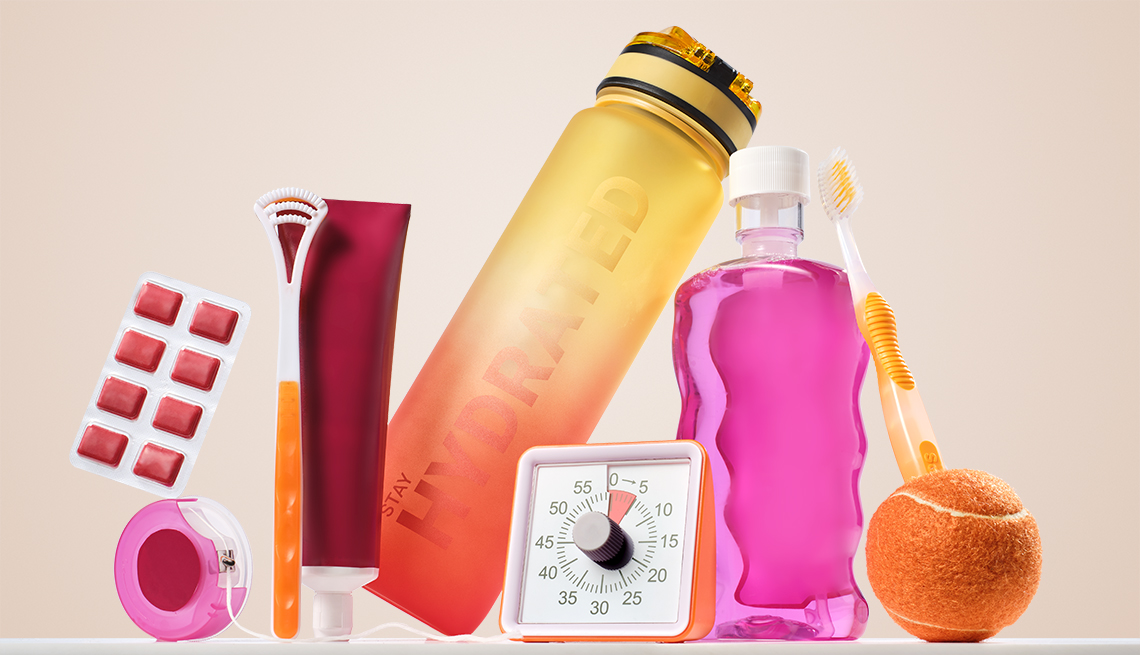Play all audios:
4. ISSUE: THE RETURN OF CAVITIES THE ANSWER: Add more fluoride Even if you survived the “cavity-prone years” of yore, you may suddenly be finding yourself back under the drill. Nearly 1 in
5 adults 65 or older have untreated tooth decay, thanks to issues like dry mouth and receding gums. The answer? Fluoride, an ingredient that’s consistently been shown to protect against
tooth decay. “Fluoride is a valuable tool, not only with children but older adults too,” Calabrese says. Along with a fluoride toothpaste, he might also recommend a fluoride rinse, available
at your drugstore, or a high-concentration prescription fluoride paste, rinse or varnish, applied as directed by your dentist, for more staying power. 5. ISSUE: A NEW ‘SWEET TOOTH’ THE
ANSWER: Plan your treats We begin to lose some of our 10,000 taste buds after age 50, which may eventually lead us to crave more intense flavors such as sweets. If you want to “help” your
grandkids with their Halloween haul, limit your indulgence to one treat per day. The more times a day you expose teeth to sugar, the more opportunities for a bacteria feeding frenzy, advises
ADA’s Jones. HOW OFTEN SHOULD I SEE A DENTIST? There is no set formula, says dentist and ADA spokesperson Judith Jones. If your oral hygiene and habits are top-notch, your dentist may give
you the green light to come in once every nine to 12 months. But if you have gum disease, diabetes or cardiovascular disease, you'll be instructed to go more often, perhaps three or
four times per year. “Higher bacterial load around teeth in plaque causes inflammation, which is detrimental when you have chronic conditions,” she says. 6. ISSUE: DRY MOUTH THE ANSWER: Make
like a ballplayer The most common cause of dry mouth is medications, Calabrese says. A wide array of meds can have this effect, including — but not limited to — antidepressants,
anticholinergics, antihistamines and high blood pressure drugs. But dry mouth is more than an annoyance; saliva plays a big role in reducing the risk of various tooth and gum diseases. So do
what baseball players do: Keep water on hand to sip regularly throughout the day and stock up on sugar-free gum. It helps to remove excess food particles and promote the flow of saliva. 7.
ISSUE: BAD BREATH THE ANSWER: Clean your tongue First, add tongue scraping to your morning and night routine, suggests dentist Elisa Chavez, director of the Pacific Center for Equity in Oral
Health Care at the University of the Pacific. Tongue scrapers are inexpensive, U-shaped devices that remove the gunky white layer that harbors the bacteria that cause bad breath. You can
also do this by brushing your tongue with your toothbrush after cleaning your teeth. But be aware that chronic bad breath can be a sign of a more serious issue, such as tooth decay.
_Editor's Note: This story, originally published Oct. 1, 2021, has been updated to reflect new information._

